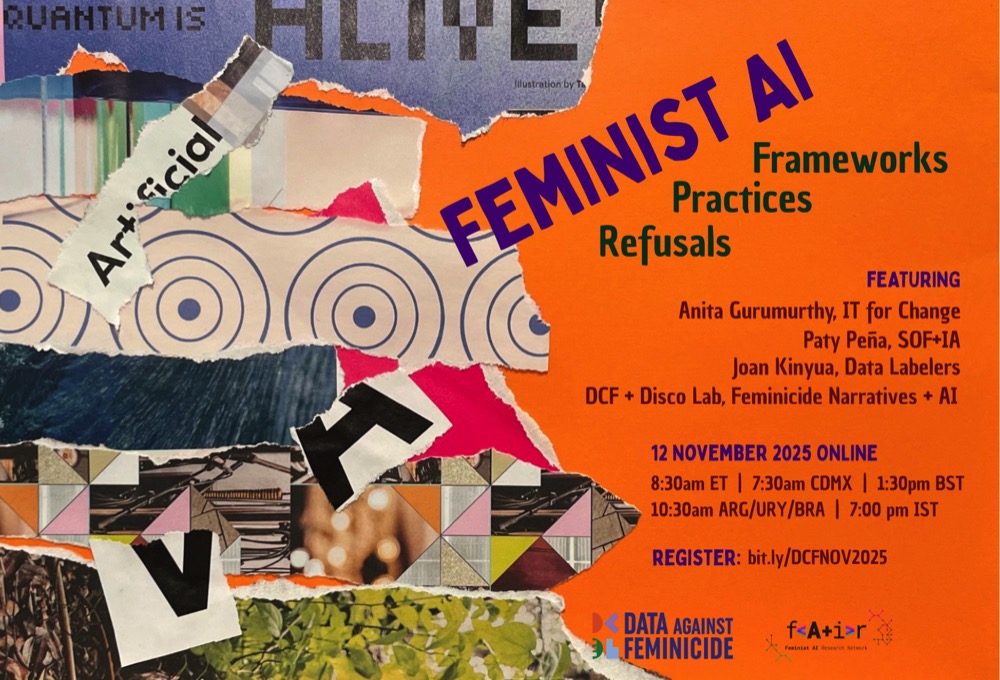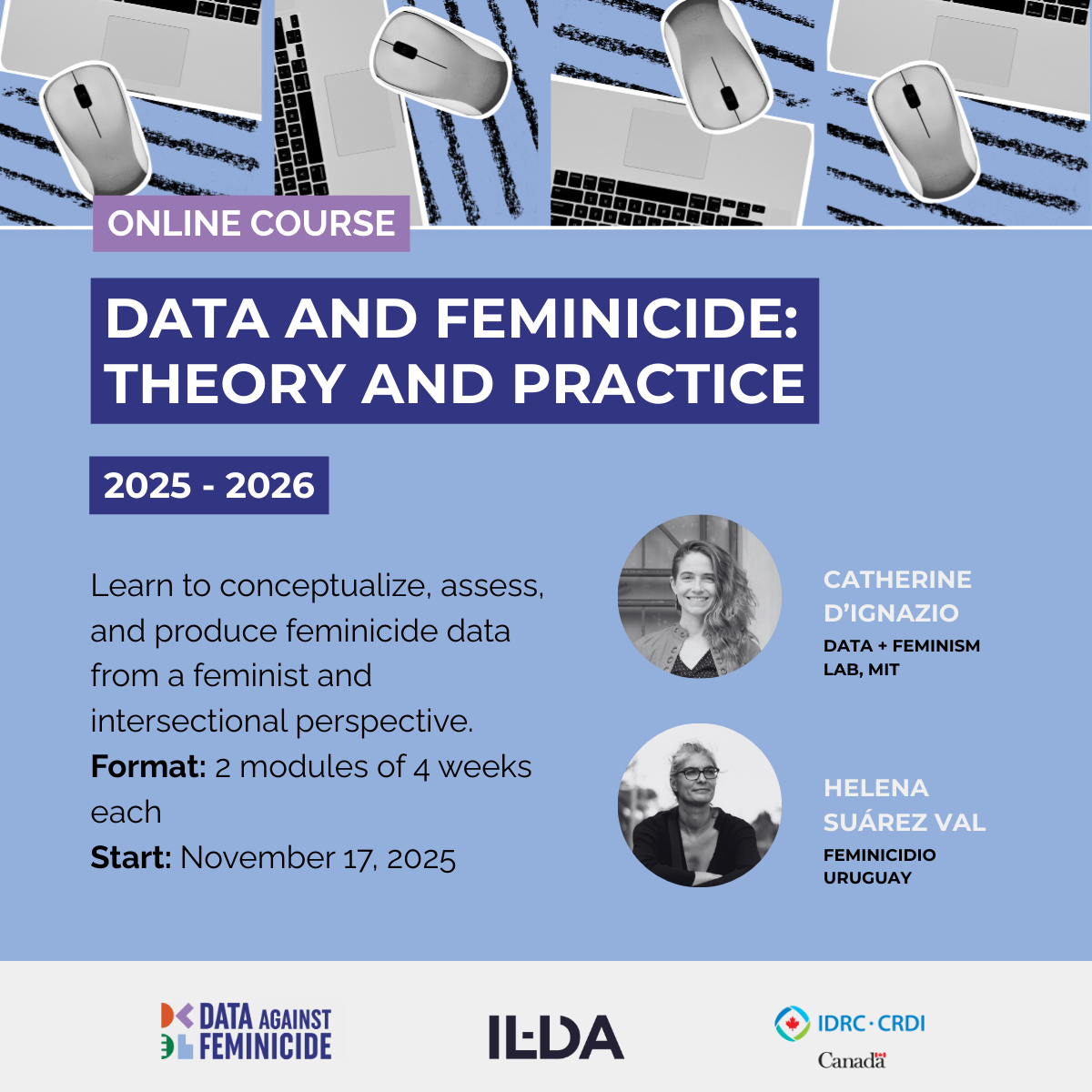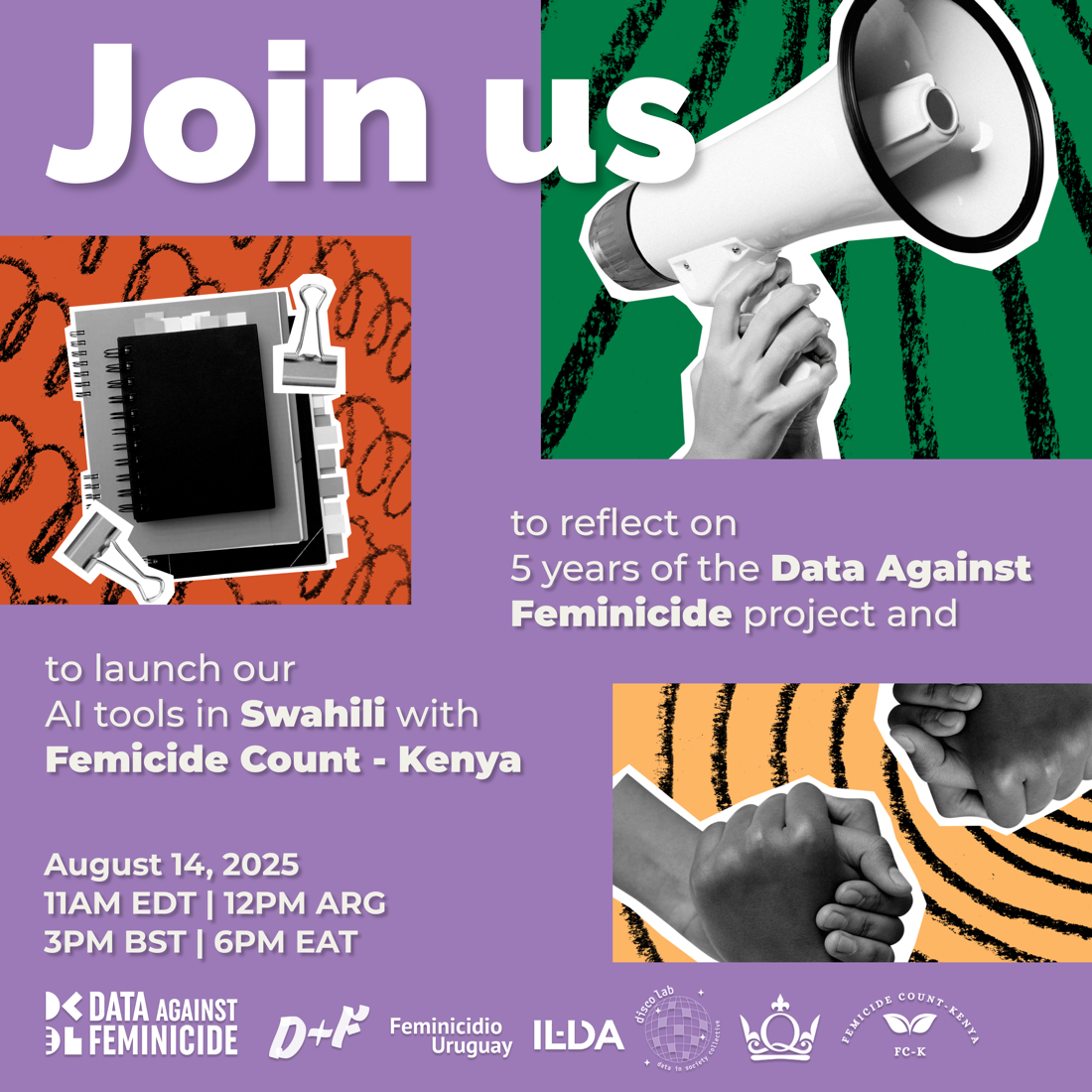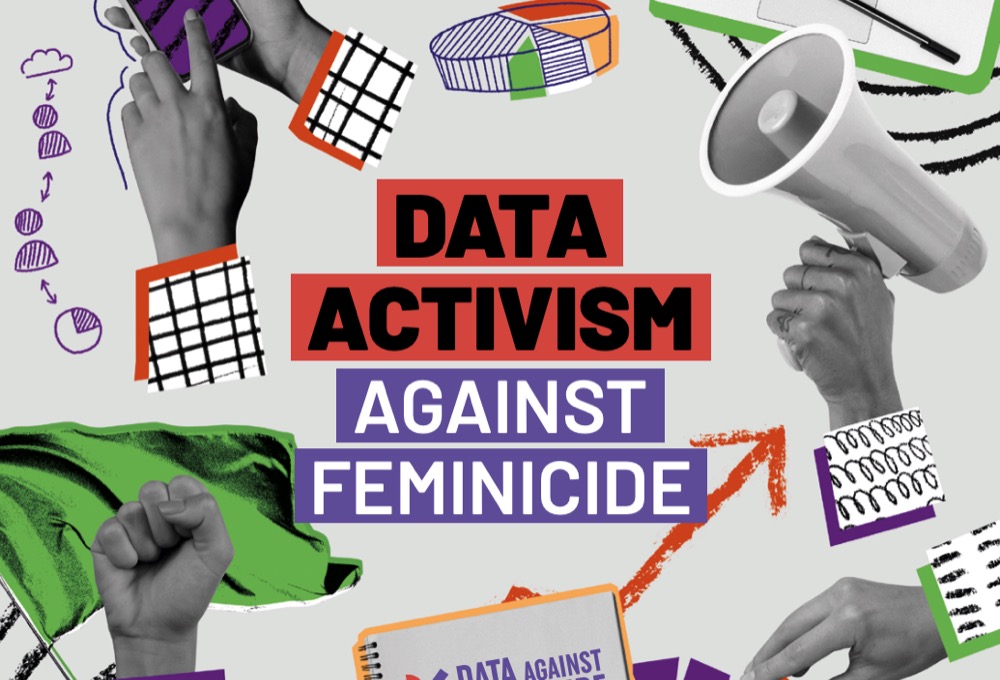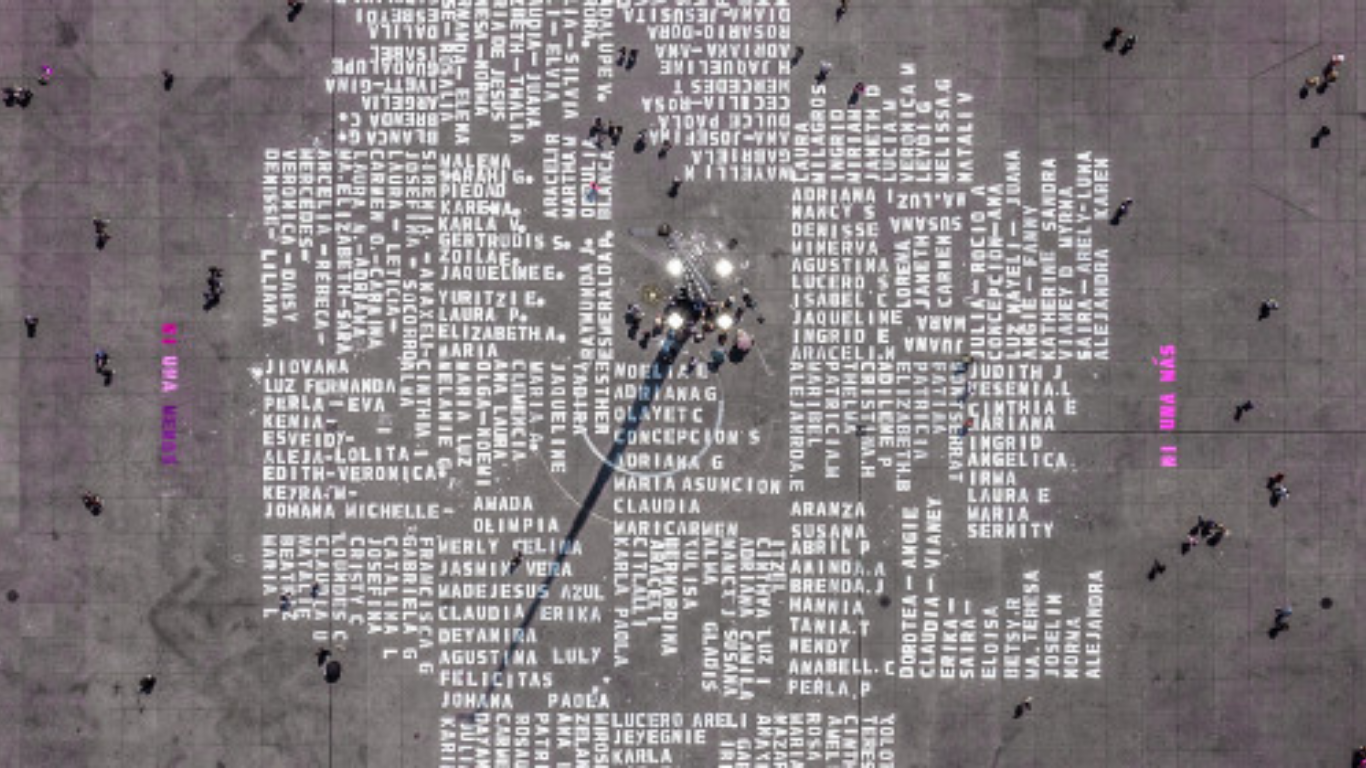Data Against Femicide (DCF) is a South-North participatory action research and design project that supports the work of activists and civil society organizations that produce data on gender-related violence and its most lethal expression: feminicide.
This project has three key objectives:
- Understand the practices, strategies, and challenges involved in data activism against femicide in different contexts.
- Foster an international community of practice around the production of data on femicide.
- Co-design and develop technological tools to support data production and social communication on femicide.
To achieve these objectives, activities have been developed in four areas: community, research, tool co-design, and training.
It’s important to note that the project does not collect or aggregate data, but rather supports the existing practices of activists who curate femicide data in their own contexts.
DCF Leadership Team
The project was hatched in 2019, out of a conversation between Catherine D’Ignazio, Silvana Fumega, and Helena Suárez Val, who came together through a shared interest in femicide data. Since 2023, Isadora Cruxên has joined the leadership team. ILDA has supported the project since its inception.
From the beginning, DCF has counted on the support of a broad and diverse team of researchers, students, and allied projects and organisations, such as Iniciativa Latinoamericana por los Datos Abiertos (ILDA), Data Culture (Northeastern University), Media Cloud, and Data in Society Collective (DISCO Lab, Brown University).
All the people and organizations who have collaborated on DCF are listed below.

Isadora Cruxên

Catherine D’Ignazio

Silvana Fumega
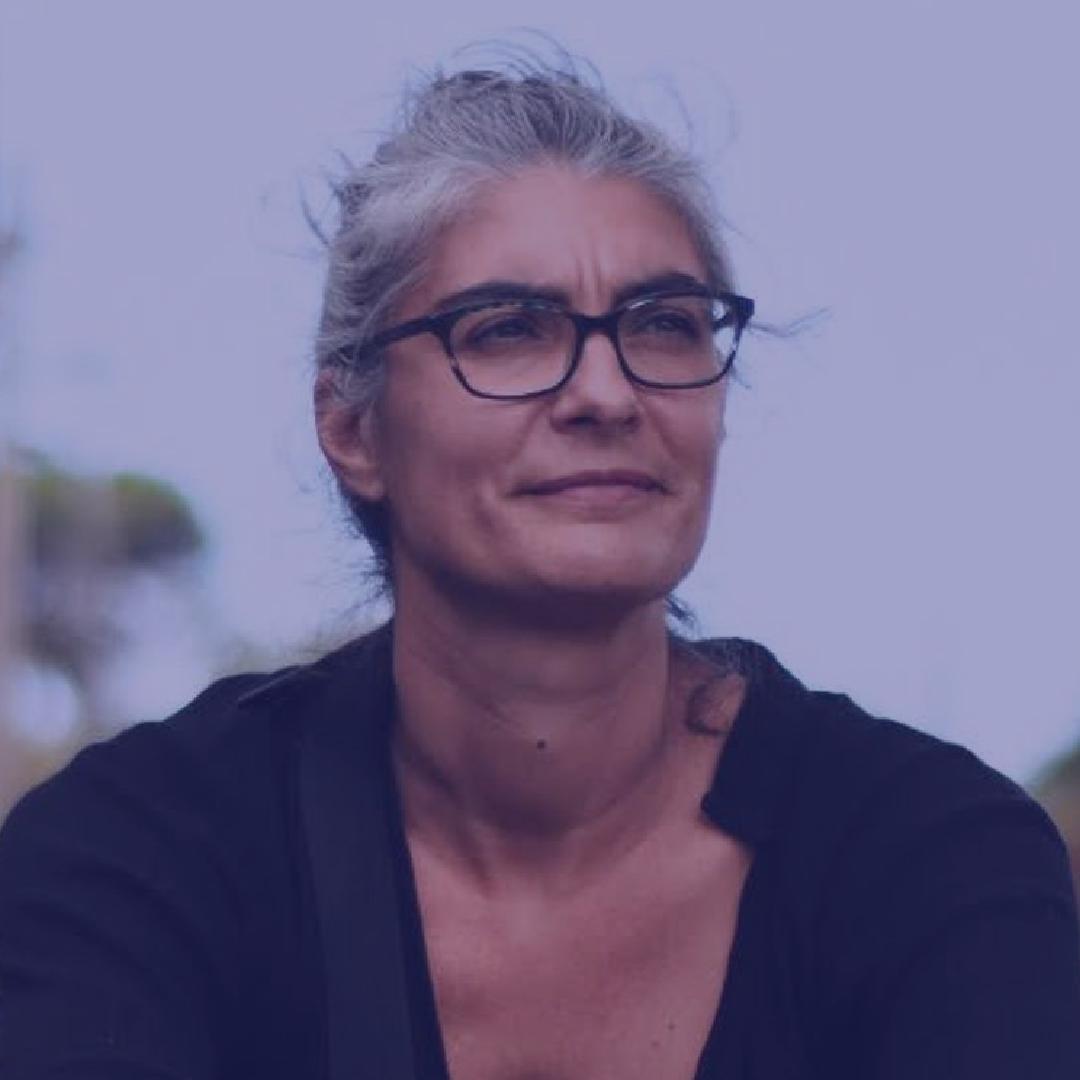
Helena Suárez Val
How did DCF come about?
As part of her work on the book Data Feminism (MIT Press, 2020), Catherine D’Ignazio, with Lauren F. Klein, analyzed the lack of reliable official data on femicide as “missing data” and the production of femicide data by activists and civil society organizations as “feminist counterdata.” While working on Data Feminism in 2019, Catherine spent a sabbatical in Buenos Aires and interviewed several organizations working at the intersection of data science and feminist issues, including Silvana Fumega, then Director of Research and Policy at ILDA. When Catherine established the Data + Feminism Lab in 2020, one of the first goals was to create feminist technologies for activist work and to support the production and use of femicide data.
In early 2017, ILDA began an exploratory study to understand how changes in data production and use could contribute to understanding and ultimately combating femicide in Latin America and the Caribbean. ILDA designed an action research methodology to assess the problem, understand how data could contribute to a solution, and establish recommendations for governments in the region. ILDA’s regional data standard on femicide/feminicide, led at the time by Silvana, was initially supported by the International Development Research Centre (IDRC), the Avina Foundation, and, in its second phase, by the Inter-American Development Bank (IDB).
Activist-researcher Helena Suárez Val founded Feminicidio Uruguay in 2015, a project dedicated to monitoring, recording, and mapping cases of femicide in Uruguay. She initially began collecting data as part of a collective effort organized by the Coordinadora de Feminismos del Uruguay to publicly protest, grieve, and make visible the gender-related murders of women in Uruguay. Beginning in 2016, Helena continued the project independently and has since been producing and publishing data on feminicides, attempted feminicides, and other violent deaths of women. She was one of the civil society actors consulted on the first draft of the ILDA femicide data standard. In 2019, Helena was beginning a PhD at the Center for Interdisciplinary Methodologies at the University of Warwick, focusing her research on the political effects of the circulation of femicide data on social media. One of the objectives of her doctoral proposal was to build a community of practice around femicide data.
In August 2019, the Catherine, Helena and Silvana met to begin developing ideas for a project that would combine their different approaches to femicide data. Thus, Data Against Feminicide was born .
In 2023, Isadora Cruxên joined the leadership team. Isadora, currently an associate professor at Queen Mary University of London, is a political economist with an interest in processes of political mobilization and activism, as well as in forms of participatory planning and research. She joined DCF in the summer of 2020 as a student researcher and ended up leading the qualitative analysis of the interviews, in addition to proposing many new ideas for scaling up the project. Between 2021 and 2023, in collaboration with Alessandra Jungs de Almeida, Isadora led the co-design and translation of the DCF tools into Portuguese with Brazilian activists. The DCF project reflects her broader interest in the politics of knowledge and data production as spaces of resistance against extraction and oppression.
Collaborators
Leadership
Isadora Cruxên, Catherine D’Ignazio, Silvana Fumega, Helena Suárez Val.
Data + Feminism Lab
Fedaa Alsoufi, Natasha Ansari, Alicia Jael Delgado-Alcaraz, Amelia Dogan, Olivia Fiol, Patricia Michelle Garcia Iruegas, Mariel García-Montes, Alessandra Jungs de Almeida, Ana Letelier, Raj Movva, Luciana Ribeiro da Silva , Wonyoung So, Nikki Stevens, Harini Suresh, Melissa Teng, Thuận Tran.
Partners
Jimena Acosta Romero, curadora independiente de arte y diseño, Rahul Bhargava, Data Culture Lab/Media Cloud, Angeles Martinez Cuba, consultora del Banco Mundial, Harini Suresh and Yujia Gao, DISCO Lab.
ILDA
Javiera Atenas, Violeta Belver, Maria Esther Cervantes, Hassel Fallas, Gloria Guerrero, Manuel Podetti, Ana Sofia Ruiz Schmidt.
Codesign Collaborators
Feminicidio Uruguay, Sovereign Bodies Institute, African American Policy Forum, Women Count USA, Black Femicide US, Observatorio Nacional MuMaLá, Mujeres de Negro Rosario, Néias – Observatório de Feminicídios Londrina, Foro Ceará de Mulheres, Levante Feminista Contra o Feminicídio, Lesbocidio y Transfeminicidio, Lupa Feminista contra o Feminicídio – Coletivo Feminino Plural, Laboratório de Estudos de Feminicídios, Grupo de Trabalho sobre Feminicídio na Bahía, Femicide Count Kenya.
Redes
Tierra Común
Feminist Network of Artificial Intelligence in Latin America and the Caribbean


